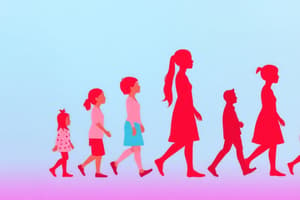Podcast
Questions and Answers
During which age range is an individual in peak physical condition?
During which age range is an individual in peak physical condition?
- 41 to 50 years
- 41 to 60 years
- 20 to 40 years (correct)
- 61 years and older
What physiological change typically occurs in late adulthood according to the text?
What physiological change typically occurs in late adulthood according to the text?
- Respiratory system deterioration (correct)
- Vision problems
- Insignificant changes in vital signs
- Concern for health problems
Which age group experiences 'empty nest' as a psychosocial aspect?
Which age group experiences 'empty nest' as a psychosocial aspect?
- 61 years and older
- 41 to 60 years (correct)
- 20 to 40 years
- All age groups
In infancy, which of the following is NOT a physiological change?
In infancy, which of the following is NOT a physiological change?
What is a common psychosocial challenge mentioned for late adulthood?
What is a common psychosocial challenge mentioned for late adulthood?
Which age range faces challenges related to caring for children and aging parents?
Which age range faces challenges related to caring for children and aging parents?
Which reflex is NOT typically observed in infants?
Which reflex is NOT typically observed in infants?
What psychosocial aspect is developed in infants during the stage of infancy?
What psychosocial aspect is developed in infants during the stage of infancy?
What happens to the metabolism in late adulthood according to the text?
What happens to the metabolism in late adulthood according to the text?
Which of the following is NOT a feature of an infant's airway?
Which of the following is NOT a feature of an infant's airway?
During infancy, what is the purpose of antibodies in an infant's body?
During infancy, what is the purpose of antibodies in an infant's body?
Which of the following is NOT a common sleep pattern observed in infants?
Which of the following is NOT a common sleep pattern observed in infants?
What age range does the Toddler stage typically cover?
What age range does the Toddler stage typically cover?
What aspect of development is primarily focused on during the Preschool Age stage?
What aspect of development is primarily focused on during the Preschool Age stage?
What is a key physiological characteristic of the School Age stage?
What is a key physiological characteristic of the School Age stage?
In which stage do individuals typically experience a desire for independence and begin forming a personal code of ethics?
In which stage do individuals typically experience a desire for independence and begin forming a personal code of ethics?
What psychological aspect is highlighted in the Psychosocial domain during the Toddler stage?
What psychological aspect is highlighted in the Psychosocial domain during the Toddler stage?
Which of the following is a key focus under the Physiological aspect during Adolescence?
Which of the following is a key focus under the Physiological aspect during Adolescence?
Study Notes
Infancy (Birth to Age 1 Year)
- Pulse and respiratory rate decrease, while blood pressure increases
- Weight increases, and the airway is shorter, narrower, less stable, and easily obstructed
- Infants are "nose breathers" and have a shorter, narrower airway
- Reflexes include Moro, Palmar, Rooting, and Sucking reflexes
- Sleep patterns and bone growth are key physiological developments
- Psychosocially, bonding and trust vs. mistrust are critical, with temperament influencing development
Toddler (12 to 36 Months)
- Body temperature regulation improves, and weight gain is significant
- Fine motor skill development and teeth eruption occur
- Toilet training is a key milestone
- Cognitive development accelerates, with rapid learning and exploration
Preschool Age (3 to 5 Years)
- Body systems continue to develop and refine
- Peer groups become important, with learning new skills and comparing oneself to others
- Feeling part of a group and developing social skills are critical
School Age (6 to 12 Years)
- Body temperature and weight gain continue to regulate
- Teeth development and growth occur
- Transitioning to decision-making skills, self-esteem, and moral development are key
- Peer relationships and social skills become increasingly important
Adolescence (13 to 19 Years)
- Rapid growth spurt occurs during this phase
- Desire for independence, concern for image, and personal code of ethics develop
- Self-identity and relationships with peers are critical
Early Adulthood (20 to 40 Years)
- Habits and routines develop, and physical condition peaks
- Highest level of stress, challenges of children and family, and career establishment occur
- Psychosocially, establishing relationships and independence are key
Middle Adulthood (41 to 60 Years)
- Insignificant changes in vital signs, with vision problems and concern for health issues
- More task-oriented, approaching problems as challenges, and experiencing "empty nest"
- Caring for children and aging parents becomes a priority
Late Adulthood (61 Years and Older)
- Vital signs dependent upon health, cardiovascular system becomes less efficient
- Respiratory system deteriorates, and metabolism decreases
- Psychosocially, enhancement challenges, living environment, self-worth, financial burdens, and death and dying become prominent concerns
Studying That Suits You
Use AI to generate personalized quizzes and flashcards to suit your learning preferences.
Related Documents
Description
Explore the various stages of human development from infancy to late adulthood with a focus on physical, cognitive, and socioemotional changes. Understand the key milestones and challenges faced during each stage.




